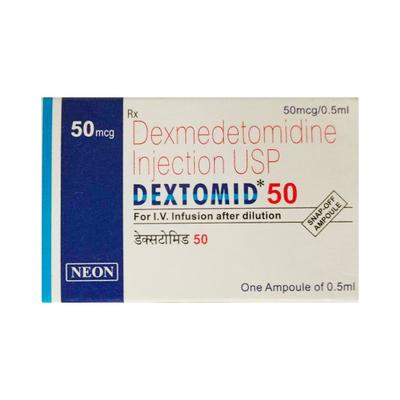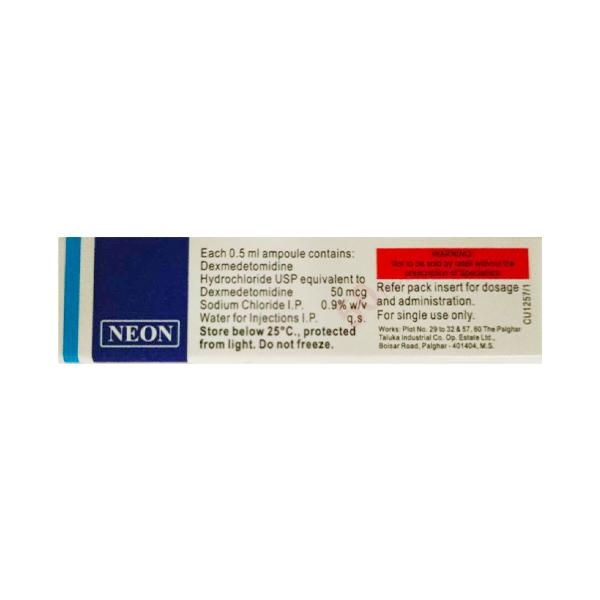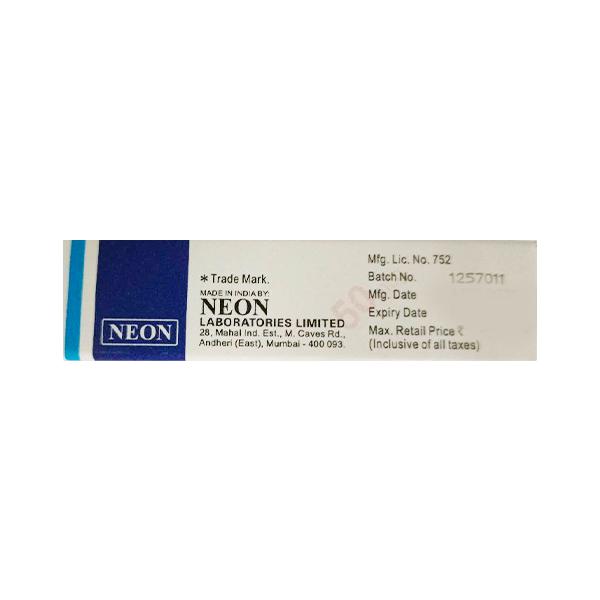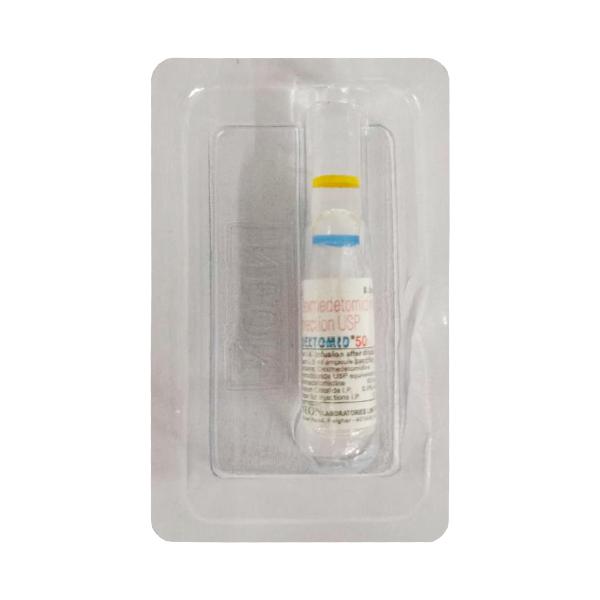

Netmeds First Membership
Quick Links
Introduction About DEXTOMID 50MCG INJECTION
DEXTOMID 50MCG INJECTION contains Dexmedetomidine which belongs to the group of medicines called Sedatives. It is used in adults to provide sedation (a state of calm, drowsiness or sleep) in hospital intensive care settings. It is also used to provide conscious sedation during different diagnostic or surgical procedures.
DEXTOMID 50MCG INJECTION is not recommended for use in patients with heart rhythm disorders, a history of stroke or other serious conditions affecting the blood supply to the brain. Consult your doctor before receiving this medicine.
DEXTOMID 50MCG INJECTION should be used with caution in patients suffering from severe kidney or liver problems, abnormally slow heart rate, low blood pressure or chronic hypertension, low blood volume (Ex. after bleeding), diabetes mellitus, neurological disorder (Ex. head or spinal cord injury or stroke). Consult your doctor before receiving this medicine.
DEXTOMID 50MCG INJECTION should not be used during pregnancy and breastfeeding unless clearly necessary. Consult your doctor before receiving this medicine.
DEXTOMID 50MCG INJECTION should be used with caution in elderly patients aged above 65 years. Consult your doctor before receiving this medicine.
The most common side effects of receiving DEXTOMID 50MCG INJECTION are slow heart rate, low or high blood pressure, change in breathing pattern. Consult your doctor if any of these symptoms get worse.
Uses Of DEXTOMID 50MCG INJECTION
- To provide sedation for adult patients in hospital intensive care settings
- To provide conscious sedation during different diagnostic or surgical procedures
How DEXTOMID 50MCG INJECTION Works
DEXTOMID 50MCG INJECTION works by binding to certain receptors in the brain called alpha-2 adrenoceptors and manages the release of norepinephrine (a chemical called neurotransmitter). Thus providing pain relief during procedures.
How to use DEXTOMID 50MCG INJECTION
DEXTOMID 50MCG INJECTION is administered to you by a doctor or nurse prior to and/or during diagnostic or surgical procedures requiring sedation (procedural/conscious sedation). It is diluted and it is given to you as an infusion (drip) into your veins.
Your doctor will decide the correct dose and duration for you depending upon your age, body weight, general condition of health, the level of sedation needed and how you respond to the medicine.
Side Effects Of DEXTOMID 50MCG INJECTION
Common
- slow or fast heart rate
- low or high blood pressure
- change in breathing pattern or shortness of breath
- chest pain or heart attack
- nausea, vomiting or dry mouth
- restlessness
- high temperature
Uncommon
- hallucinations (seeing or hearing things that are not present)
- reduced heart function, cardiac arrest
- swelling of the stomach
- thirst
How To Manage Side Effects
Nausea and vomiting:
Try to receive this medicine with or just after a meal or a snack. Stick to simple meals. Avoid eating oil rich or spicy foods. Consult your doctor if nausea and vomiting does not improve.
Dry mouth:
Try to drink plenty of cold water. Chew sugar-free gum or suck on sugar-free hard candies. Limit your caffeine intake. Sip on cold unsweetened drinks and use lip balm if your lips are dry. Try to brush your teeth twice a day and use mouthwash. Consult your doctor if the dry mouth gets worse.
Warning & Precautions
Pregnancy
DEXTOMID 50MCG INJECTION should not be used during pregnancy unless clearly necessary. Consult your doctor before receiving DEXTOMID 50MCG INJECTION.
Breastfeeding
DEXTOMID 50MCG INJECTION should not be used in breast feeding women unless clearly necessary. Consult your doctor before receiving DEXTOMID 50MCG INJECTION.
Driving and Using Machines
DEXTOMID 50MCG INJECTION has major impact on the ability to drive and use machines. After you have been given this medicine, you must not drive, operate machinery or work in dangerous situations until the effects are completely gone. Ask your doctor when you can start doing these activities again and when you can go back to this kind of work.
Alcohol
Talk to your doctor about the use of alcohol after sedation/wake-up.
Kidney
DEXTOMID 50MCG INJECTION should be used with caution in patients suffering from severe kidney problems. Consult your doctor before receiving DEXTOMID 50MCG INJECTION.
Liver
DEXTOMID 50MCG INJECTION should be used with caution in patients suffering from severe liver problems. Consult your doctor before receiving DEXTOMID 50MCG INJECTION.
Allergy
Do not receive this medicine if you are allergic to dexmedetomidine or any of the other ingredients of this medicine.
Heart Disease
DEXTOMID 50MCG INJECTION is not recommended for use in patients with heart rhythm disorders (heart block grade 2 or 3), very low blood pressure which does not respond to> management. Consult your doctor before receiving this medicine.
Inform your doctor if you have an abnormally slow heart rate (either due to illness or high levels of physical fitness) as it may increase the risk for cardiac arrest and if you have low blood pressure or chronic hypertension, certain heart diseases.
Others
DEXTOMID 50MCG INJECTION is not recommended for you, if you have:
- recently had a stroke or other serious condition affecting blood supply to the brain
Before receiving DEXTOMID 50MCG INJECTION, inform your doctor if you have:
- low blood volume (Ex. after bleeding)
- neurological disorder (Ex. head or spinal cord injury or stroke)
- ever developed a serious fever after taking some medicines called anaesthetics
- diabetes mellitus
Use in pediatrics:
The safety and efficacy of DEXTOMID 50MCG INJECTION in pediatric patients have not been established for procedural or ICU sedation. Consult your doctor before receiving DEXTOMID 50MCG INJECTION.
Use in geriatrics:
DEXTOMID 50MCG INJECTION should be used with caution in elderly patients aged above 65 years due to increased risk of low heart rate and low blood pressure. Consult your doctor before receiving this medicine.
Interactions
A. Drug - Drug interactions:
Before receiving DEXTOMID 50MCG INJECTION, inform your doctor if you are taking any of the following medicine:
- midazolam, propofol (medicines help you to sleep or cause sedation)
- opioids Ex. morphine, codeine, alfentanil (medicines used to manage severe pain)
- anesthetic medicines Ex. sevoflurane, isoflurane (medicines used to produce loss of consciousness before and during surgery)
- medicines which lower blood pressure and heart rate (Ex. propranolol, metoprolol)
- medicines that cause temporary paralysis (Ex. succinylcholine, atracurium)
- diazepam (a medicine used to manage anxiety, fits and alcohol withdrawal)
- amphotericin B (used to manage fungal infections)
Overdosage:
DEXTOMID 50MCG INJECTION will be administered to you only by a doctor or a nurse in a hospital and so it is unlikely to receive an overdose. Symptoms of overdose includes blood pressure may go up or down, heartbeat may slow down, breathe more slowly, feel more drowsy.
Synopsis
| Drug | : | Dexmedetomidine |
| Pharmacological Category | : | Alpha2-adrenergic receptor agonist |
| Therapeutic Indication | : | To provide sedation or conscious sedation during diagnostic or surgical procedures |
| Dosage Forms | : | Injection |
More Information
- Keep this medicine out of reach of children
- Store at a room temperature
FAQs About DEXTOMID 50MCG INJECTION
What is DEXTOMID 50MCG INJECTION used for?
DEXTOMID 50MCG INJECTION is used in adults to provide sedation (a state of calm, drowsiness or sleep) in hospital intensive care settings. It is also used to provide conscious sedation during different diagnostic or surgical procedures. Consult your doctor before receiving DEXTOMID 50MCG INJECTION.
Does DEXTOMID 50MCG INJECTION lower heart rate?
Patients who receive DEXTOMID 50MCG INJECTION will experience a decrease in heart rate and may be at high risk of developing severe bradycardia leading to cardiac arrest. So, it should be used with caution in patients with heart rhythm disorder and low blood pressure. Your doctor will monitor your heart rate and blood pressure during the management.
Can I receive DEXTOMID 50MCG INJECTION during pregnancy?
DEXTOMID 50MCG INJECTION should not be used during pregnancy unless clearly necessary. Inform your doctor if you are pregnant or are planning to have a baby, ask your doctor for advice before receiving DEXTOMID 50MCG INJECTION.
What are the side effects of receiving DEXTOMID 50MCG INJECTION?
The most common side effects of receiving DEXTOMID 50MCG INJECTION are slow heart rate, low or high blood pressure, change in breathing pattern or stopping breathing. Consult your doctor if any of these symptoms gets worse.
Why is DEXTOMID 50MCG INJECTION used in ICU?
DEXTOMID 50MCG INJECTION produces sedation while maintaining a degree of arousability and may reduce the duration of mechanical ventilation (a machine that helps you to breathe when you are having surgery or cannot breathe on your own due to illness) and delirium (change in mental status) among patients in the intensive care unit (ICU).
Does DEXTOMID 50MCG INJECTION cause fever?
DEXTOMID 50MCG INJECTION may induce hyperthermia or fever, which may be resistant to traditional cooling methods, such as administration of cooled intravenous fluids and antipyretic medications. If you experience drug-related hyperthermia or pyrexia, your doctor will discontinue DEXTOMID 50MCG INJECTION and monitor you until body temperature normalizes.
Why should DEXTOMID 50MCG INJECTION not be used more than 24 hours?
Your doctor will determine the dose and duration of this medicine. Prolonged exposure to DEXTOMID 50MCG INJECTION beyond 24 hours may be associated with tolerance (decrease in response) and tachyphylaxis (sudden decrease in response to this drug after administration) and a dose-related increase in side effects such as low blood pressure, slow heart rate and cardiac arrest.
References
1. KD. Tripathi. General Anaesthetic. Essentials of medical pharmacology. Seventh edition. 2013. Page –384.
2. Bertram G. Katzung. Adrenoceptor Agonists & Sympathomimetic Drugs. Basic & Clinical Pharmacology. Fourteenth Edition. 2018. Page – 153.
3. Manpreet Kaur and P. M. Singh1. Current role of dexmedetomidine in clinical anesthesia and intensive care. NIH, National Library of Medicine, National center for biotechnology information. PubMed Central. Jul-Dec 2011. [Accessed on 1st December 2022] https://www.ncbi.nlm.nih.gov/pmc/articles/PMC4173414/
4. Bradley reel, Christopher V. Maani. Dexmedetomidine. NIH, National Library of Medicine, National center for biotechnology information. Statpearls. May 2022. [Accessed on 1st December 2022] https://www.ncbi.nlm.nih.gov/books/NBK513303/
5. Orion Corporation Orion Pharma. Electronic Medicines Compendium (EMC). [Revised in July 2022] [Accessed on 1st December 2022] https://www.medicines.org.uk/emc/files/pil.4783.pdf
6. Fresenius Kabi Austria GmbH. Health Products Regulatory Authority (HPRA). [Revised in August 2021] [Accessed on 1st December 2022] http://www.hpra.ie/img/uploaded/swedocuments/a183bc86-7466-4de8-a8bf-df5eb1924843.pdf
7. Dexmedetomidine. Hospira, Inc. [Revised in August 2022] [Accessed on 1st December 2022] https://labeling.pfizer.com/ShowLabeling.aspx?id=4404#S8.2
8. DEXIT 50 (Dexmedetomidine 50mcg). Troikaa Pharmaceuticals Ltd. [Accessed on 1st December 2022] https://www.troikaa.com/wp-content/uploads/2021/10/Common-Products-List-Novogen-Excluded.pdf
9. Drugbank.com. Dexmedetomidine. [Accessed on 1st December 2022] https://go.drugbank.com/drugs/DB00633












